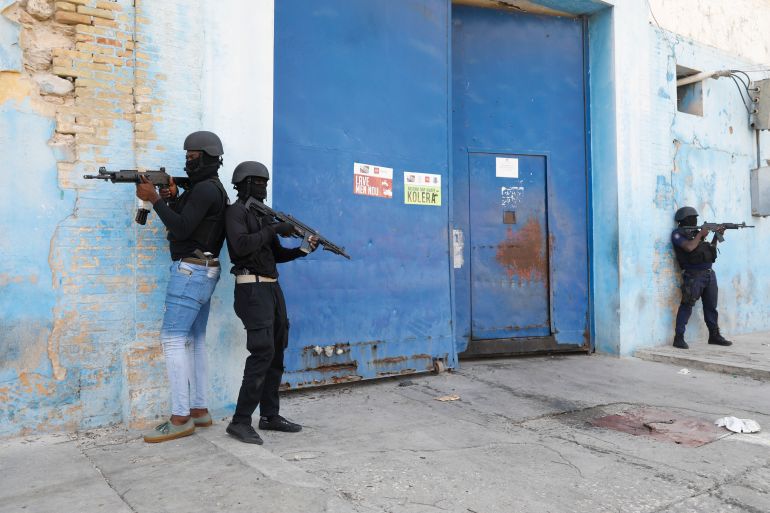As gang violence rages, UN expert says Haiti now needs 5,000 foreign police
New report says the number of victims of gang violence has surged, calls for rapid deployment of UN-backed international security force.

Haiti needs up to 5,000 international police to tackle “catastrophic” gang violence that has killed more than 1,500 people in the first three months of this year alone, including many children, according to a United Nations expert.
The comments by William O’Neill on Thursday came as he presented a new report by the Office of the High Commissioner for Human Rights (OHCHR) calling for “immediate and bold action” to tackle the “cataclysmic” situation in the country.
Haiti has faced years of political turmoil and violence but instability increased following the 2021 assassination of President Jovenel Moise. The subsequent power vacuum boosted the influence of the dozens of armed gangs operating in the country, including powerful groups that control most of the capital, Port-au-Prince.
Unrest intensified in February when heavily armed rivals led by former policeman Jimmy “Barbecue” Cherizier joined forces and unleashed waves of attacks in a bid to remove unelected Prime Minister Ariel Henry. Currently locked out of Haiti, Henry has promised to resign amid the pressure but the violence targeting hospitals, banks and other critical institutions has continued unabated amid a deepening hunger and displacement crisis.
The OHCHR report said the number of victims of gang violence surged last year, with 4,451 people killed and 1,668 wounded. Hundreds of people were lynched, with many others stoned or burned alive by the so-called “self-defence brigades”.
Gangs are recruiting and abusing boys and girls, with some children being killed for trying to escape, the report also said.
People have been killed in their homes in reprisal for their alleged support for the police or rival gangs, while others have been killed in the street by snipers or in the crossfire, it added. One of the victims was a three-month-old baby.
Gangs are also using sexual violence “to brutalize, punish and control people,” the report said, citing women raped during gang attacks in neighbourhoods, “in many cases after seeing their husbands killed in front of them”.
“The recent escalation of violence has heightened human rights abuses, including killings, kidnappings, and rapes, especially against women and young girls,” the report said, and called on states to support the rapid deployment of a UN-backed international security force.
“All these practices are outrageous and must stop at once,” UN High Commissioner for Human Rights Volker Turk said in a statement, calling for immediate action in a country on the “brink of collapse”.
Corruption, impunity, poor governance, together with increasing levels of gang violence brought #Haiti to the brink of collapse.
I reiterate the need for an urgent deployment of a Multinational Security Support mission to help the National Police to stop violence – @volker_turk
— UN Human Rights (@UNHumanRights) March 28, 2024
Following a Haitian government request, the UN Security Council in October approved the deployment of an international mission to help restore security. Kenya offered to lead it but the force is yet to be deployed.
UN officials in July last year said Haiti needed between 1,000 and 2,000 international police trained to deal with gangs but O’Neill said on Thursday the situation is so much worse today that double that number and more are needed to help police regain control of security.
“It is more than urgent that the force gets in there in some way, shape or form as soon as possible,” O’Neill said, warning that if the deployment “takes much longer, there may not be much” of a police force to support.
Henry, meanwhile, has been stranded in Puerto Rico since the gangs’ coordinated attacks began while he was visiting Kenya, trying to finalise details for the deployment of the UN-approved force.
Kenyan Prime Minister William Ruto has since said his country will wait until a transitional council is established in Haiti to deploy up to 1,000 personnel. The Bahamas, Bangladesh, Barbados, Benin and Chad have also pledged personnel.
Separately, Caribbean leaders are facilitating the creation of the new ruling council to be formed from several Haitian political groups following Henry’s resignation announcement.
The body is billed to have nine members with voting powers, however internal squabbling over how to share authority has delayed its formation.